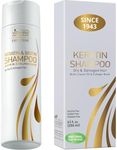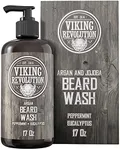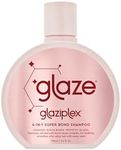Buying Guide for the Best Antifungal Shampoos
Choosing the right antifungal shampoo can be crucial for effectively treating scalp conditions like dandruff, seborrheic dermatitis, or fungal infections. The key is to understand the active ingredients and how they work, as well as considering your specific scalp and hair needs. It's important to identify the symptoms you're experiencing and choose a shampoo that targets those issues. Additionally, consider any sensitivities or allergies you may have to certain ingredients. Always follow the instructions on the product for the best results, and consult a healthcare professional if you're unsure about which product to choose.Active IngredientsActive ingredients in antifungal shampoos are the components that target and eliminate fungal infections. Common active ingredients include ketoconazole, selenium sulfide, and zinc pyrithione. Ketoconazole is known for its broad-spectrum antifungal properties, making it effective for severe cases. Selenium sulfide helps reduce flakiness and itching, while zinc pyrithione is milder and suitable for regular use. When choosing a shampoo, consider the severity of your condition. For mild dandruff, zinc pyrithione might suffice, but for more persistent issues, ketoconazole or selenium sulfide could be more effective.
Hair and Scalp TypeYour hair and scalp type can influence how an antifungal shampoo works for you. If you have oily hair, a shampoo with selenium sulfide might help control excess oil production. For dry or sensitive scalps, look for shampoos with moisturizing properties or those labeled as gentle. If your hair is color-treated, ensure the shampoo is safe for colored hair to prevent fading. Understanding your hair and scalp type will help you choose a product that not only treats the fungal issue but also maintains the health of your hair.
Frequency of UseThe frequency with which you should use an antifungal shampoo depends on the severity of your condition and the product's formulation. Some shampoos are designed for daily use, while others are more potent and should be used only a few times a week. Overuse of strong antifungal shampoos can lead to scalp irritation or dryness. If you're dealing with a mild condition, a shampoo suitable for regular use might be ideal. For more severe issues, follow the recommended usage on the product label, and adjust based on how your scalp responds.
Additional BenefitsMany antifungal shampoos offer additional benefits such as conditioning agents, soothing ingredients like aloe vera, or vitamins to promote scalp health. These can be important if you want a product that not only treats the fungal issue but also improves the overall condition of your hair and scalp. If you have a sensitive scalp, look for shampoos with soothing ingredients. If you're looking to improve hair texture, consider those with conditioning properties. Choosing a shampoo with additional benefits can enhance your hair care routine and provide a more comprehensive solution.
Scent and SensitivityThe scent of a shampoo can be a personal preference, but it's also important to consider if you have any sensitivities to fragrances. Some antifungal shampoos have a medicinal smell due to their active ingredients, while others may have added fragrances to improve the scent. If you have a sensitive scalp or are prone to allergies, opt for a fragrance-free or hypoallergenic formula. The right scent can make your hair washing experience more pleasant, but it's crucial to ensure it doesn't cause irritation or allergic reactions.



















